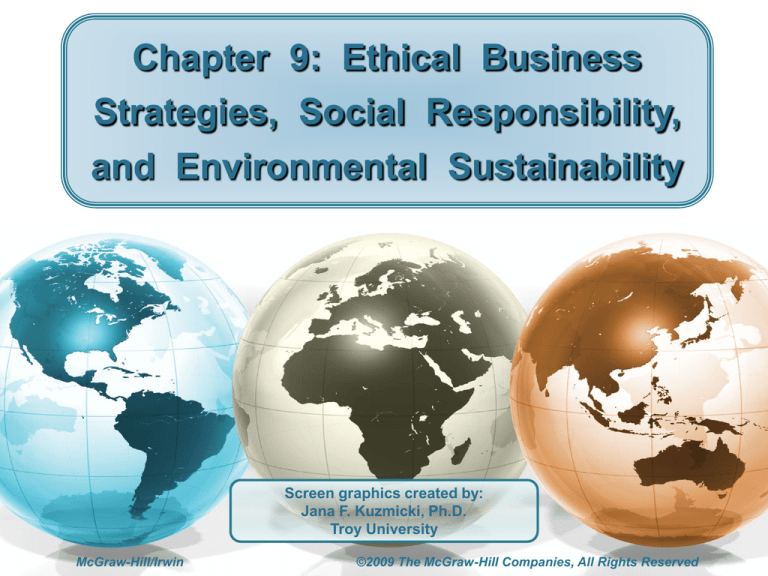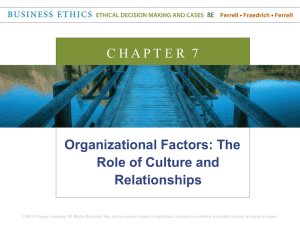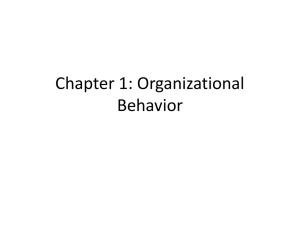
Chapter 9: Ethical Business
Strategies, Social Responsibility,
and Environmental Sustainability
Screen graphics created by:
Jana F. Kuzmicki, Ph.D.
Troy University
McGraw-Hill/Irwin
©2009 The McGraw-Hill Companies, All Rights Reserved
“When morality comes up
against profit, it is seldom
profit that loses.”
Shirley Chisholm
Former Congresswoman
“There is one and only one social responsibility
of business – to use its resources and engage in
activities designed to increase its profits so long
as it stays within the rules of the game, which is
to say engages in free and open competition,
without deception or fraud.”
Milton Friedman
Nobel Prize-winning Economist
Chapter Learning Objectives
1. Understand why business conduct is judged according to
the ethical standards of society at large rather than a
special set of ethical standards for businesses only.
2. Understand the principal drivers of unethical strategies
and business behavior.
3. Learn why unethical business conduct can be very costly
for a company’s shareholders.
4. Become familiar with the various approaches to
managing a company’s ethical conduct.
5. Gain an understanding of the concepts of corporate
social responsibility, corporate citizenship, and
environmental sustainability.
6. Become familiar with both the moral case and the
business case for ethical business conduct and socially
responsible business behavior.
1-4
Chapter Roadmap
What Do We Mean by Business Ethics?
Where Do Ethical Standards Come From – Are
They Universal or Dependent on Local Norms and
Situational Circumstances?
The Three Categories of Management Morality
Drivers of Unethical Strategies and Business
Behavior
Why Ethical Strategies Matter
Approaches to Managing a Company’s Ethical
Conduct
Social Responsibility and Corporate Citizenship
Strategies
1-5
Linking Strategy to Ethics
and Social Responsibility
Key Issues
Should there be a link between a
company’s efforts to craft and execute a
winning strategy and its duties to
Conduct activities in an ethical manner?
Demonstrate socially responsible behavior by
Being a committed corporate citizen?
Attending to needs of
non-owner stakeholders?
Limit its strategic initiatives to those meeting
needs of consumers without depleting
resources needed by future generations
1-6
What Is Business Ethics?
Business ethics involves applying general
ethical principles and standards to business
behavior
Ethical principles in business are not
different from ethical principles in general
Business actions are judged
By general ethical standards of society
Not by a set of rules businesspeople
apply to their own conduct
1-7
How Do Ethical Standards Impact the
Tasks of Crafting and Executing Strategy?
Two sets of questions must be considered by
senior executives when reviewing a new
strategic initiative
Is what we are proposing to do fully compliant
with our code of ethical conduct? Is there
anything here that could be considered ethically
objectionable?
Is it apparent that this proposed action is in
harmony with our core values? Are any conflicts
or concerns evident?
The litmus test of a company’s code of ethics is
the extent to which it is embraced in crafting
strategy and in operating the business day to day!
1-8
Are Ethical Standards Universal or
Dependent on Local Norms?
Three schools of thought regarding extent
to which ethical standards can be applied . . .
Ethical Universalism
Ethical Relativism
Integrative Social Contracts Theory
1-9
Concept of Ethical Universalism
According to the school of ethical
universalism . . .
Same standards of what is ethical and
what is unethical resonate with peoples
of most societies regardless of
Local traditions and
Cultural norms
Thus, common ethical standards can be used to
judge conduct of personnel at companies
operating in a variety of
Country markets and
Cultural circumstances
1-10
Examples of Universal
Ethical Principles or Norms
Honesty
Trustworthiness
Respecting rights of others
Practicing the Golden Rule
Treating people with dignity and respect
Exercising due diligence in product safety
Acting in a manner that does not
Harm others or
Pillages the environment
1-11
What Is the Appeal
of Ethical Universalism?
Draws on collective views of multiple
societies and cultures to place clear
boundaries on what constitutes
Ethical business behavior and
Unethical business behavior
Regardless of what country a
company is operating in
Where basic moral standards do not vary
significantly according to local cultural
beliefs, traditions, or religious convictions, a
multinational company can
Apply a code of ethics more or less evenly
across its worldwide operations
1-12
Concept of Ethical Relativism
According to the school of ethical
relativism . . .
Different societies/cultures/countries
Put more/less emphasis on some values than
others
Have different standards of right and wrong
Have different social mores
and behavioral norms
What is ethical or unethical
Must be judged in light of local
customs and social mores and
Can vary from one country to another
1-13
Payment of Bribes and Kickbacks
A thorny ethical problem is faced
by multinational companies
Degree of cross-country variability in paying
bribes as part of business transactions
Companies forbidding payment of bribes in
their codes of ethics face a formidable
challenge in countries where payments are
entrenched as a local custom
Foreign Corrupt Practices Act prohibits U.S.
companies from paying bribes in all
countries where they do business
1-14
Test Your Knowledge
Paying bribes and kickbacks to grease business
transactions
A. violates ethical principles of right and wrong in all
countries.
B. is ethically acceptable according to the principle of
ethical universalism.
C. is acceptable to immoral managers but not to amoral
managers.
D. should be considered ethically appropriate by a
company so long as such payments are normal and
customary in the countries where such payments are
made.
E. may be ethically acceptable according to the
principle of ethical relativism if paying bribes and
kickbacks is normal and customary practice in a
country.
1-15
Ethical Relativism =
Multiple Sets of Ethical Standards
Proponents of the ethical relativism school
maintain there are
Few ethical absolutes to judge a company’s
conduct in various countries
Plenty of situations where ethical
norms are contoured to fit
Local customs and traditions
Local beliefs about what is fair
Local standards of “right” and “wrong”
Ethical problems in business cannot be fully
resolved without appealing to the shared
convictions of the parties in question
1-16
Drawbacks of Ethical Relativism
The ethical relativism rule of “when in Rome,
do as the Romans do” presents problems
When the envelope is pushed, it is
tantamount to rudderless ethical standards
It is ethically dangerous for company personnel
to assume that local ethical standards are an
adequate guide to ethical behavior
What if local standards condone
kickbacks and bribery?
What if local standards blink
at environmental degradation?
From a global markets perspective, ethical
relativism results in a maze of conflicting ethical
standards for multinational companies wanting
to address the issue of what ethical standards to
enforce companywide
1-17
Concept of Integrative
Social Contracts Theory
According to the integrative social
contracts theory, the ethical standards a
company should try to uphold are governed
by both
A limited number of universal ethical principles
that are widely recognized as putting legitimate
ethical boundaries on actions and behavior in all
situations
and
The circumstances of local cultures,
traditions, and shared values that further
prescribe what constitutes
Ethically permissible behavior and
What does not
1-18
Appeal of Integrative
Social Contracts Theory
Universal ethical principles establish “moral free
space” based on the collective view of multiple
societies and cultures
Commonly held views about morality and ethical
principles combine to form a “social contract” with
society
It is appropriate for societies or companies to go
beyond universal ethical principles and specify local
or second-order ethical norms
Where firms have developed ethical codes, the
standards they call for provide appropriate ethical
guidance
Social contracts theory maintains adherence to
universal or first-order ethical norms should always
take precedence over local or second-order norms! 1-19
Three Categories of Management Morality
Moral manager
Managerial
ethical and
moral
principles
Immoral
manager
Amoral manager
Characteristics of a Moral Manager
Dedicated to high standards of ethical
behavior in
Own actions
How the company’s business is to be conducted
Considers it important to
Be a steward of ethical behavior
Demonstrate ethical leadership
Pursues business success
Within confines of both letter and spirit of laws
With a habit of operating well above what laws
require
1-21
Characteristics of an Immoral Manager
Actively opposes ethical behavior in business
Willfully ignores ethical principles in making
decisions
Views legal standards as barriers to overcome
Pursues own self-interests
Is an example of self-serving greed
Ignores interests of others
Focuses only on bottom line –
making one’s numbers
Will trample on others to avoid being trampled
upon
1-22
Characteristics of an
Intentionally Amoral Manager
Believes business and ethics should not
be mixed since different rules apply to
Business activities
Other realms of life
Does not factor ethical considerations into
own actions since business activity lies
outside sphere of moral judgment
Views ethics as inappropriate for
tough, competitive business world
Concept of right and wrong is
lawyer-driven (what can we get by
with without running afoul of the law)
1-23
Characteristics of an
Unintentionally Amoral Manager
Is blind to or casual about ethics of
decision-making and business actions
Displays lack of concern regarding
whether ethics applies to company actions
Sees self as well-intentioned
or personally ethical
Typical beliefs
Do what is necessary to comply with laws and
regulations
Government provides legal framework stating
what society will put up with—if it is not illegal, it
is allowed
1-24
Evidence of Managerial Immorality
in the Global Business Community
Evidence exists a sizable majority of
managers are either
Amoral or
Immoral
Results of recent issues of the Global
Corruption Report indicate corruption is
widespread across the world
Corruption extends beyond bribes and
kickbacks
1-25
Table 9.1: Corruption Perceptions Index (CPI), Selected Countries, 2007
What Are the Drivers of Unethical
Strategies and Business Behavior?
Large numbers of immoral
and amoral business people
Overzealous pursuit of personal gain,
wealth, and other selfish interests
Heavy pressures on company managers
to meet or beat earnings targets
Company cultures that place profits and
good performance ahead of ethical behavior
Overzealous Pursuit of Personal Gain,
Wealth, and Selfish Interests
People obsessed with wealth accumulation,
greed, power, status, and other selfinterests often
Push ethical principles aside in their
quest for self gain
Exhibit few qualms in
Skirting the rules or
Doing whatever is necessary
to achieve their goals
Engage in all kinds of unethical
strategic maneuvers and behaviors
1-28
Heavy Pressures on Company Managers
to Meet or Beat Earnings Targets
Managers often feel enormous pressure to do
whatever it takes to deliver good financial
performance
Actions often taken by managers
Cut costs wherever savings show up immediately
Squeeze extra sales out of early deliveries
Engage in short-term maneuvers to make the numbers
Stretch rules to extreme, until limits of ethical conduct are
overlooked
Executives feel pressure to hit performance targets
since their compensation depends heavily on
company performance
Fundamental problem with a “make the numbers”
syndrome
Company does not create additional value for customers
or improve its competitiveness
1-29
Company Cultures that Put Bottom
Line Ahead of Ethical Behavior
In an ethically corrupt or amoral work
climate, people have a company-approved
license to
Ignore “what’s right”
Engage in most any behavior or employ most
any strategy they think they can get away with
Pressures to conform to cultural norms
can prompt otherwise honorable people to
Make ethical mistakes
Succumb to the many opportunities
to engage in unethical practices
1-30
Why Ethical Strategies Matter
An unethical strategy
Is morally wrong
Reflects badly on the character of company
personnel
An ethical strategy is
Good business
In the best interest of shareholders
1-31
Characteristics of Managers Committed
to Ethical Approaches to Strategy-Making
Possess strong moral and ethical
characteristics
Strongly advocate a corporate code
of ethics and strict ethics compliance
Display genuine commitment to certain
corporate values and business practices
Walk the talk in
Displaying a company’s stated values
Living up to ethical business principles and
standards
Adopt values statements/ethics codes that truly
paint the white lines for a company’s business
practices
Consciously opt for strategic actions passing
moral scrutiny
1-32
Figure 9.1: The Business Costs of Ethical Failures
Test Your Knowledge
Which one of the following is false when it comes to
making a case for why a company’s strategy should be
ethical?
A. An unethical strategy can put a company’s reputation
at risk and do lasting damage, especially when the
misdeeds get into the public spotlight and make
media headlines.
B. An ethical strategy is in the best interest of
shareholders.
C. An unethical strategy reflects badly on the character
of the company personnel involved.
D. Shareholders profits are not greatly reduced by using
ethical strategies.
E. A strategy that is unethical in whole or in part is
morally wrong.
1-34
Approaches to Managing a
Company’s Ethical Conduct
Unconcerned or Nonissue Approach
Damage Control Approach
Compliance Approach
Ethical Culture Approach
Table 9.2: Four Approaches to Managing Business Ethics
Characteristics of Unconcerned Approach
Prevalent at companies whose executives
are immoral and unintentionally amoral
Notions of right and wrong in business
matters are defined by government via
prevailing laws and regulations —
after that, anything goes
If the law permits “unethical behavior,”
why stand on ethical principles
Companies are usually out to make
greatest possible profit at most any cost
Strategies used, while legal, may embrace
elements that are ethically shady
1-37
Characteristics of
Damage Control Approach
Favored at companies whose managers are
intentionally amoral but who fear scandal
May adopt a code of ethics as windowdressing
Adept at using “spin” to “explain away” the
use of unethical strategy elements or
discount the impact of shady actions
Executives look the other way
when shady behavior occurs
Executives may condone questionable
actions that help a company reach
earnings targets or bolster its market
standing
1-38
Characteristics of
Compliance Approach
From light to forceful compliance is favored
at companies whose managers
Lean toward being somewhat amoral but are highly
concerned about having ethically upstanding reputations
or
Are moral and see strong compliance methods as best
way to impose and enforce high ethical standards
Ethics code violators are disciplined, sending a
clear signal that complying with ethical standards
must be taken seriously
Commitment to eradicate unethical
behavior stems from a desire to
Avoid cost and damage associated
with unethical conduct or
Gain favor from stakeholders from having a
highly regarded reputation for ethical behavior
1-39
Pursuing a Compliance Approach:
Typical Actions
Make code of ethics a visible and regular part of
communications with employees
Implement ethics training programs
Appoint a chief ethics officer
Have ethics committees to
give guidance on ethics matters
Institute formal procedures for
investigating alleged ethics violations
Conduct ethics audits to measure and document
compliance
Install ethics hotlines to help detect and deter
violations
1-40
Potential Weakness
of Compliance Approach
Moral control resides in a company’s
code of ethics and in the ethics
compliance system rather than in
Strong peer pressures for ethical
behavior that come from ingraining
a highly ethical corporate culture and
An individual’s own moral
responsibility for ethical behavior
1-41
Characteristics of
Ethical Culture Approach
Top executives believe high ethical principles must
Be deeply ingrained in the corporate culture
Function as guides for “how we do things around here”
Company seeks to gain employee buy-in to
Company’s ethical standards
Business principles
Corporate values
Ethical principles in company’s code
of ethics are integral to company’s
Identity and self-image
Day-to-day operations
Strategy must be ethical
Employees must display ethical behaviors in
executing the strategy
1-42
For Discussion: Your Opinion
Is it unethical for a high school or college coach to
accept a “talent fee” or similar type of payment
from a maker of sports apparel or sports
equipment when the coach has authority to
determine which brand of apparel or equipment to
use for his/her team and subsequently chooses
the brand of the company making the payment? Is
it unethical for the maker of the sports apparel or
equipment to make such payments in expectation
that the coach will reciprocate by selecting the
company’s brand? (Would you answer be different
if “everybody” is doing it?)
1-43
For Discussion: Your Opinion
Is it unethical for a credit card company to
aggressively try to sign up new accounts
when, after an introductory period of interestfree or low-interest charges on unpaid monthly
balances, the interest rate on unpaid balances
jumps to 1.5 percent or more monthly (even
though such high rates of 18 percent or more
annually are disclosed in fine print)?
1-44
What Is Corporate Social Responsibility?
The notion that corporate executives should
balance interests of all stakeholders
began to blossom in the 1960s
Social responsibility as it applies to
businesses concerns a company’s duty to
Operate in an honorable manner
Provide good working conditions for employees
Be a good steward of the environment
Actively work to better quality of life in
Local communities where it operates and
Society at large
1-45
Concepts of Social Responsibility
and Corporate Citizenship
A company should strive to balance strategic
actions to benefit shareholders against the
duty to be a good corporate citizen
Socially responsible behaviors go beyond
Complying with legal requirements and
Corporate philanthropy activities
Socially responsible behaviors also entail
actions to earn trust and respect of stakeholders
for efforts to improve the well-being of
Employees
Local communities
Environment
Customers
Society
1-46
Figure 9.2: Demonstrating a Social Conscience: The Five
Components of Socially Responsible Business Behavior
What Is a Social Responsibility Strategy?
A company’s specific combination
of socially beneficial and community
citizenship activities it opts to
support via contributions of
Time,
Money,
Other resources.
What Is an Environmental
Sustainability Strategy?
A company’s concerted actions to meet
current needs of all stakeholders to
Protect the environment,
Provide for the longevity
of natural resources,
Maintain ecological support
systems for future generations, and
Guard against ultimate endangerment
of the planet.
Characteristics of Environmental
Sustainability Initiatives
Frequently focus on improving a company’s
“Triple-P” performance
People
Planet
Profit
Convey beneficial outcomes via
Press releases
Special sustainability reports for stakeholders
1-50
Example: Unilever’s Environmental
Sustainability Strategy
Tracked 11 sustainability agricultural indicators in its
processed foods business
Launched various programs to improve environmental
performance of suppliers
Reengineered internal processes to improve overall
performance on sustainability measures
Redesigned packaging for many products to conserve
natural resources and reduce volume of consumer waste
Addressed societal needs of consumers in developing
countries
Table 9.3: Companies With Exceptional Commitments to Sustainability
Crafting Social Responsibility and
Sustainability Strategies
The socially responsible/sustainability
strategies a company pursues impacts its ability
to achieve a competitive advantage
Management should match a company’s
social responsibility/sustainabilty strategy to its
Core values
Business mission
Overall strategy
Some companies are integrating social
responsibility and/or environmentally
sustainability objectives into their
Missions
Performance targets
Strategies
1-53
Moral Case: Corporate Social Responsibility and
Environmentally Sustainable Business Practices
Businesses should promote the betterment of
society, acting in ways to benefit all their
stakeholders because
“It’s the right thing to do!”
Based on an implied social contract, society
Grants a business the right to
conduct its business affairs
Agrees not to unreasonably restrain
a firm’s pursuit of a fair profit
In return for a “license to operate,”
a business should
Act as a responsible citizen
Do its fair share to promote the general welfare
1-54
Business Case: Socially Responsible Behavior and
Environmentally Sustainable Business Practices
Generates internal benefits
Enhances recruitment of quality employees
Increases retention of employees
Improves employee productivity
Lowers costs of recruitment and training
Reduces risk of reputation-damaging
incidents, leading to increased buyer patronage
Works in best interest of shareholders
Minimizes costly legal and regulatory actions
Provides for increased investments
by socially conscious mutual funds
and pension benefit managers
Focusing on environment issues
may enhance earnings
1-55
Test Your Knowledge
Which one of the following is false as concerns the
merits of why acting in a socially responsible manner is
“good business”?
A. To the extent that a company’s socially responsible
behavior wins applause from consumers and fortifies its
reputation, a company may win additional patronage.
B. Acting in a socially responsible manner reduces the risk of
reputation-damaging incidents.
C. Acting in a socially responsible manner is in the overall
best interest of shareholders.
D. Acting in a socially responsible manner is unlikely to have
any effect (positive or negative) on a company’s
profitability.
E. Acting in a socially responsible manner can generate
internal benefits (as concerns employee recruiting,
workforce retention, training, and improved worker
productivity).
1-56









